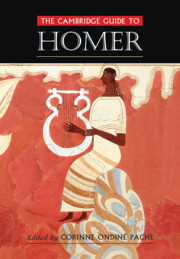Book contents
- The Cambridge Guide to Homer
- The Cambridge Guide to Homer
- Copyright page
- Contents
- Figures
- Notes on the Contributors
- General Introduction
- Part I Homeric Song and Text
- Part II Homeric World
- Introduction
- Homeric Communities
- Homeric Religion
- Homer and History
- Homeric Geography
- Homeric Materiality
- Key Topics
- Afterlife in Homer
- Assemblies and Councils
- Athletic Competition
- Basileus and Anax in Homer and Mycenaean Greek Texts
- Blegen, Carl
- Boars’ Tusk Helmets
- Burial Practices
- Catalogue of Ships: Archaeology
- Catalogue of Ships: Literary Aspects
- Class Relations
- The Literary Tradition of Destruction of Cities
- Divine Epiphany in Homer
- Family and Marriage in Homer
- Feasting and Drinking in Homer
- Archaeology of Hero Cults
- Hittite Literary Evidence
- Homeric Archaeology
- Homeric Economy
- Household Organization
- Lefkandi
- Mycenae
- Nestor’s Cup
- Nostoi
- Offerings in Homer
- Personification in Homer
- Prayers and Vows
- Pylos
- Religious Festivals in Homer
- Schliemann, Heinrich
- Shield of Achilles
- Slavery in Homer and Hesiod
- Supplication in Homer
- Troy and Its Treasures
- Warfare in Homer
- Warrior Graves
- Weapons and Armor
- Women in Homer
- Part III Homer in the World
- Bibliography
- Index
Homeric Economy
from Key Topics
Published online by Cambridge University Press: 22 February 2020
- The Cambridge Guide to Homer
- The Cambridge Guide to Homer
- Copyright page
- Contents
- Figures
- Notes on the Contributors
- General Introduction
- Part I Homeric Song and Text
- Part II Homeric World
- Introduction
- Homeric Communities
- Homeric Religion
- Homer and History
- Homeric Geography
- Homeric Materiality
- Key Topics
- Afterlife in Homer
- Assemblies and Councils
- Athletic Competition
- Basileus and Anax in Homer and Mycenaean Greek Texts
- Blegen, Carl
- Boars’ Tusk Helmets
- Burial Practices
- Catalogue of Ships: Archaeology
- Catalogue of Ships: Literary Aspects
- Class Relations
- The Literary Tradition of Destruction of Cities
- Divine Epiphany in Homer
- Family and Marriage in Homer
- Feasting and Drinking in Homer
- Archaeology of Hero Cults
- Hittite Literary Evidence
- Homeric Archaeology
- Homeric Economy
- Household Organization
- Lefkandi
- Mycenae
- Nestor’s Cup
- Nostoi
- Offerings in Homer
- Personification in Homer
- Prayers and Vows
- Pylos
- Religious Festivals in Homer
- Schliemann, Heinrich
- Shield of Achilles
- Slavery in Homer and Hesiod
- Supplication in Homer
- Troy and Its Treasures
- Warfare in Homer
- Warrior Graves
- Weapons and Armor
- Women in Homer
- Part III Homer in the World
- Bibliography
- Index
Summary
The economy of the society depicted in the Iliad, Odyssey, and in Hesiod’s Works and Days was primarily agricultural and pastoral but above subsistence level. These farming activities provided enough surplus to support the development of craft production (textiles, metal-working, stone masons) and inter-regional trade, though not on a scale found in later periods of Greek history.
- Type
- Chapter
- Information
- The Cambridge Guide to Homer , pp. 343 - 345Publisher: Cambridge University PressPrint publication year: 2020

